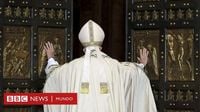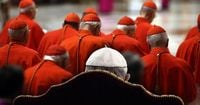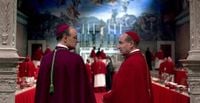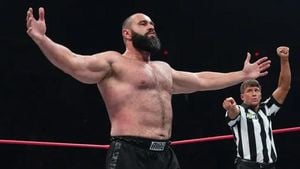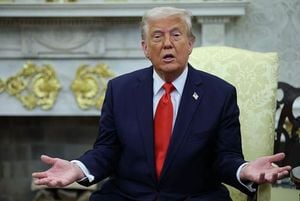Pope Francis, the spiritual leader of the Catholic Church, passed away on Monday, April 21, 2025, at the age of 88 after a twelve-year papacy that emphasized openness and dialogue. His death has initiated the centuries-old process of electing a new pontiff, raising questions about the future leadership of a religion that counts approximately 1.4 billion followers worldwide.
Following the announcement of his death, Cardinal Kevin Farrell, the camarlengo, confirmed the passing with a doctor and a death certificate. Farrell will oversee the immediate arrangements, including the placement of Pope Francis's body in a coffin at 20:00 local time in the chapel of his residence, Domus Sanctae Marthae. This process will be presided over by Farrell, who is also responsible for sealing the Pope's private quarters and destroying his ring and lead seal.
The period of mourning typically lasts nine days, beginning between the fourth and sixth day after the Pope's death. The Vatican has indicated that the body could be transferred to St. Peter's Basilica for public viewing on Wednesday, April 23, 2025, though this decision will be finalized by the cardinals on Tuesday, April 22, 2025.
Pope Francis had requested a simple funeral, stating that he did not want his body displayed on an elevated platform, a traditional practice during papal funerals. Instead, he will be laid to rest in a simple wooden coffin, a departure from the ornate caskets used by his predecessors. His funeral is expected to take place in St. Peter's Square, typically held four to six days after his death, marking a significant moment for the Catholic community.
In a notable decision, Pope Francis chose to be buried in the Basilica of Santa Maria la Mayor in Rome, rather than the traditional burial site in the Vatican crypt. This choice reflects his humble approach to the papacy and his desire for simplicity.
The process of selecting a new Pope will be conducted by the College of Cardinals, which currently consists of 252 members, of whom 135 are eligible to vote. The conclave, the gathering during which the new Pope is elected, is expected to take place within two to three weeks following the Pope's death.
During the period between the Pope's death and the election of his successor, the College of Cardinals will govern the Church. This body operates under strict secrecy in the Sistine Chapel, where the cardinals vote for their preferred candidate. The voting process can take several days, and historically, it has sometimes lasted for weeks or even months, with the famous black smoke signaling a failed vote and white smoke indicating the election of a new Pope.
After the new Pope is elected, the cardinal of highest rank will announce the decision to the public with the words "Habemus Papam," meaning "We have a Pope." The new pontiff will then appear on the balcony of St. Peter's Basilica, where he will introduce himself under the papal name he has chosen, which may differ from his birth name.
Pope Francis's papacy was marked by a focus on social justice, environmental issues, and interfaith dialogue. His death prompts reflection on his legacy and the future direction of the Church. As the world mourns, it also looks toward the future leadership of an institution that has faced numerous challenges in recent years.
In the wake of his passing, the media has begun to examine the complexities of the Vatican's institutional structure, highlighting the human and political weight of the papacy. The film industry has also taken notice, with several movies and series exploring the themes of power, faith, and the inner workings of the Catholic Church.
Among the notable titles is the 2024 film "Cónclave," which dramatizes the election process following the Pope's death, showcasing the political intrigues and conspiracies that can arise during such a pivotal moment. Another film, "The Two Popes" (2019), explores the relationship between Pope Benedict XVI and Cardinal Bergoglio, the future Pope Francis, highlighting the tensions between tradition and change.
Other cinematic works, such as "The Agony and the Ecstasy" (1965), depict the historical challenges faced by the papacy, while the documentary "Pope Francis: A Man of His Word" (2018) provides insight into the pontiff's thoughts on pressing global issues like poverty and justice.
The upcoming conclave will not only determine the future of the papacy but also reflect the ongoing evolution of the Catholic Church in a rapidly changing world. As the College of Cardinals prepares for this significant event, the global community watches closely, eager to see who will take up the mantle of leadership in this critical moment for the Church.
With the passing of Pope Francis, the Catholic Church stands at a crossroads, facing both the weight of its traditions and the imperative for renewal. The decisions made in the coming weeks will shape the Church's future and its role in addressing the challenges of the modern world.
